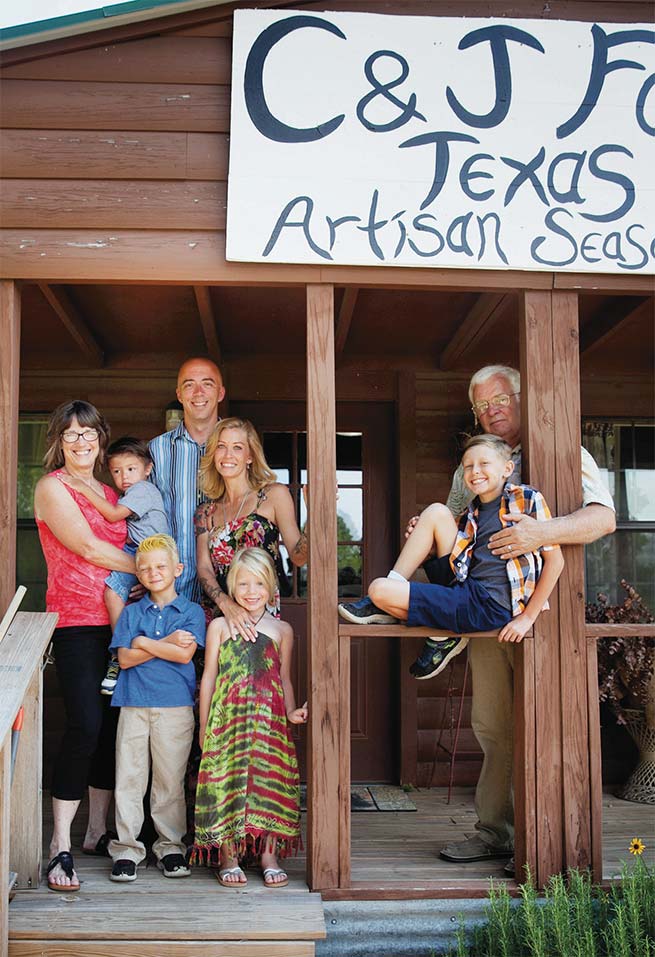
All in the family at C&J: Group of six (clockwise from left): Connie Gibson with Jonah,
Matthew, Michelle, Isabelle and Noah Tyler. Right: Jim Gibson and Seth Tyler.
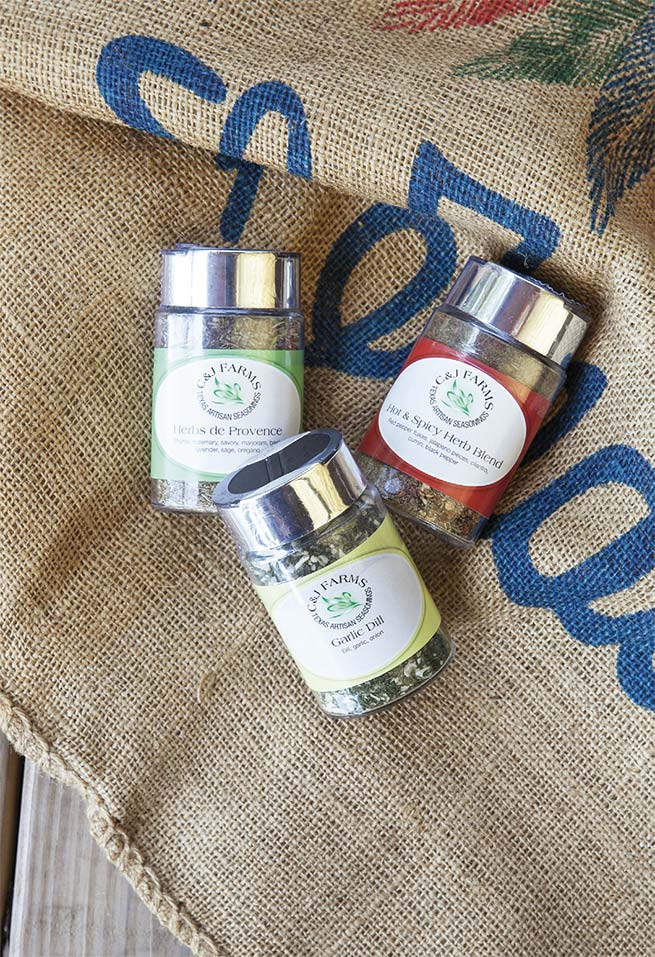
Photography by Desiree Espada
I’m not a big fan of seasoning blends. I’d rather mix and match herbs such as dried oregano and sage or fresh thyme and basil, often with a grating of lemon or orange zest, to create my own flavor profile for a particular dish.
So how did I wind up walking away from C&J Farms at a farmers market with not one, but two, seasoning blends?
It was the bite-size crackers that won me over. That, and Matthew Tyler’s impassioned pitch.
Peering out from behind his aviators, Matthew reeled off the virtues of his family’s seasoning products—made from herbs grown on their Eureka farm near Corsicana and fresher than anything on supermarket shelves—as I plied the plastic tongs to drop one seasoned cracker after another first into my hand, then into my mouth for a burst of flavor.
Minutes later I was paying for jars of Greek Seasoning and Sweet Orange & Herb Blend.
“People ask, ‘How do you make the crackers?’” says Connie Gibson, Matthew’s mother. Her first-name initial and husband Jim’s form the C&J Farms name. The Gibsons and Matthew have gathered at the farm’s little one-room store to tell me more about what they do. “They’re ridiculously easy,” chimes in Matthew on the crackers. “Kids love ’em.” He should know. He and wife Michelle live in nearby Dawson with their four, ages 3 to 11, who variously like to work the farmers market with Dad, and help and play in the gardens.
The family got so many requests for the recipe that they finally printed it on the back of a business card (see Page 32). I’m thinking they sauté the crackers. But no, they’re just mixed and bagged overnight with a seasoning blend and a little oil. What I do know is it makes the spice blend flavors pop. Makes you want to buy. And envision a bowl of seasoned crackers for munching at your next party. Matthew, who handles marketing, is a natural frontman—likeable, easygoing, knowledgeable. He trains and coordinates the farmers market sales force. They fan out to sell the jarred seasonings plus infused local honey. “We infuse it ourselves,” Connie says, using “real food.” Lavender is the best seller, but I found the snappy jalapeño beguiling.
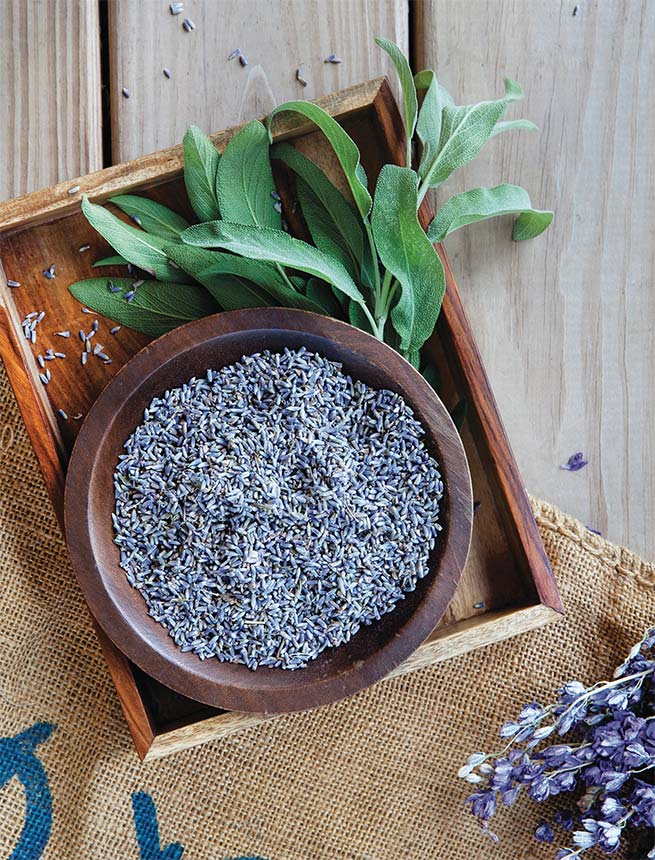
Fresh sage from Connie’s garden and lavender from Oregon.
Everything at C&J is raised sustainably,
using organic methods, such as the keyhole
garden where lavender sprouts and a menacing,
yellow-and-black Argiope aurantia
garden spider lords over the keyhole’s center
compost pit.
Over the past five years, the Gibsons have turned a hobby into a business that belongs to Connie and Jim and provides full-time employment for Matthew. Michelle designed the website.
Then a couple of years ago, Texas Highways came calling and invited them to be part of its online True Texas Gift Shop. You may also recognize the family from the State Fair of Texas. Find them just outside the Go Texan general store in the Food & Fiber Pavilion. Connie and Jim didn’t start out with a mind to make herb and spice blends. They didn’t even start out thinking to grow herbs. Rather, they were casting about for an income-generating retirement project once Jim left his job with a communications company. That was when the couple lived in McKinney.
But “the city of Dallas was coming north, consuming everything in sight,” Jim says, and they yearned for a more country way of life. So in 2002 they shifted south, leapfrogging Dallas entirely, to land on 20 acres in Eureka, east of Corsicana. Jim, who officed from home, reels off the ideas they considered: They thought about raising goats—they still have some—but the animals were too labor intensive. They considered cattle—they run a few and slaughter them for family consumption only, part of Connie’s obsession with healthy eating—but felt like they didn’t have enough land. Noticing Michelle’s and Connie’s outsized green thumbs, Jim got them thinking about herbs.
“You start by looking at what resources you have,” Jim says, “what resources to develop a business. I had a full-time job (at the time). We had the land. Michelle had tech skills.” Matthew was already successful in sales. “We knew we could grow things. Herbs have tended to be the answer. It was something we both had a passion for doing. Herb blends became the heart of the business.”
Today, in the yard outside their tin-roofed country store, you’ll find a dozen-plus show beds, where basil grows into fat bushes in the summer sun and a great stand of lemongrass waves in the shadow of a stunted hackberry. Pineapple sage, summer and winter savory, parsley, peppers, lemon balm, lemon verbena, Russian tarragon and Greek oregano thrive in timber-edged beds, metal tubs and ceramic pots. Everything is arranged in a kind of cheerful, orderly hodgepodge. Farther back on the property they have more working beds.
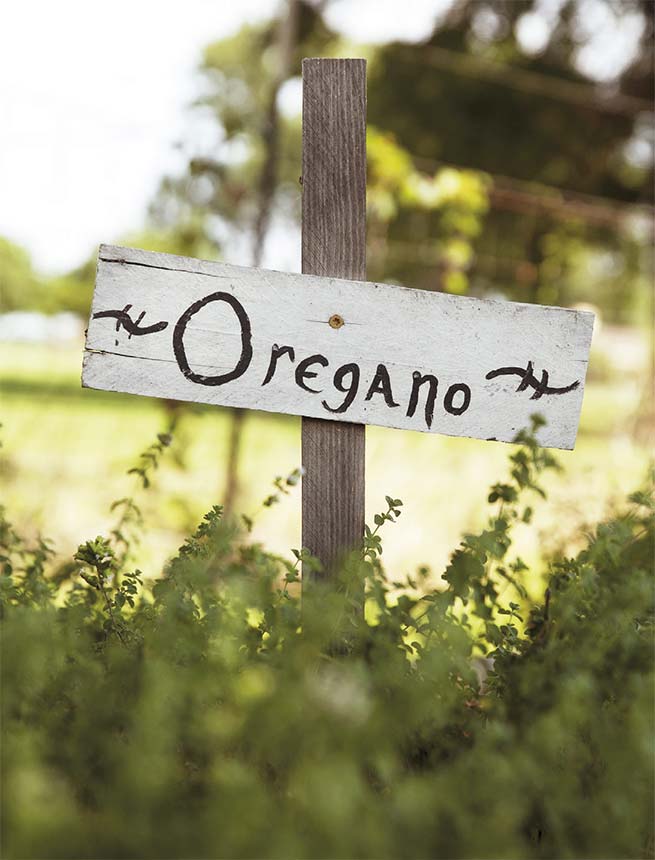
Connie’s garden.
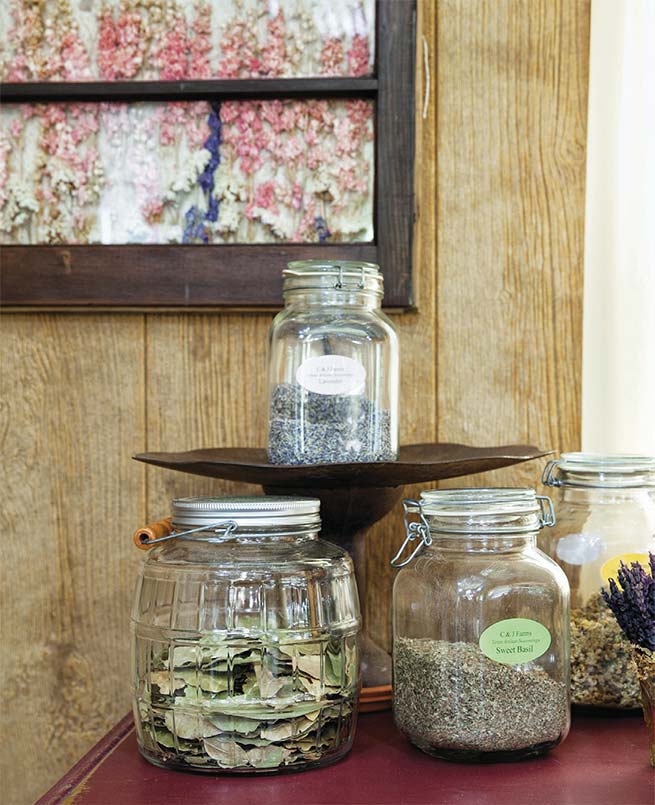
C&J sells bulk herbs. That’s one of Connie’s window-frame larkspur floral arrangements on the wall.
Everything at C&J is raised sustainably, using organic methods, such as the keyhole garden where lavender sprouts and a menacing, yellow-and-black Argiope aurantia garden spider lords over the key hole’s center compost pit. Flowers, such as hibiscus, bright purslane and hanging baskets of moss rose, add splashes of color while supporting the pollinators that buzz about. A handful of workers clip, weed and otherwise pamper the thriving plants.
Inside the store, which Jim built, spices and seasonings line shelves marked by hand-lettered signs. Connie still has bulk dried herbs plus a handful of products that have caught her eye, such as Jammit Jams, A & J’s Jellies (prickly pear cactus vinaigrette) and botanical wax sachets embedded with fl owers, herbs, fruit and shells. She also makes enchanting fl oral arrangements in old windows using pink and blue-purple larkspur. And she confesses to a soft spot for the round, purple pods of Love in a Mist. One of the reasons she and Jim opened the store was because Matthew needed some offi ce space. He gets a corner.
“Jim and I started drying the herbs,” Connie says, returning to the family’s back story. Air-drying quickly gave way to a commercial dryer. “We put dried herbs in jars and went to the local (farmers) markets. People were interested, but they didn’t know what to do with them.”
So it was back to the drawing board. Or rather, the supermarket. “We kind of realized things were labeled in the grocery store like taco seasoning, Greek seasoning. Th ey’re generally classifi ed by how you use them.” So the idea for the blends was born, buttressed by the products’ freshness. Even though the herbs are dried, you can still taste the zing. Th eir other ingredients taste fresher, too.
It took Connie about a year to develop the blends. Th ere was no magic formula, and she had no special experience. She’d just get an idea, she says, and start working with it. Today, C&J makes about 18 to 20 seasonings and spice blends, half from estate-grown herbs and half from imported ingredients such as cinnamon, ginger and sea salt. Some are strictly herb-based, such as traditional Herbs de Provence and Olive Oil Dipping Blend, and some are made with a sea salt base, such as Applewood/Jalapeño Smoked Sea Salt. Th e latter, plus their Hot & Spicy Blend and Jalapeño Honey, were Fiery Food Challenge winners at ZestFest.
“Customers drive my direction with the blends,” says Connie, who takes their feedback to heart. “Th ey say things like ‘Th is would be great without salt,’ or ‘Do you have something with more garlic?’ ‘Do you have a Cajun blend?’ ‘A taco blend?’” And C&J adds an incentive: Return an empty container and get $1 off the next seasoning purchase. If you shop online, refi lls minus the container are $1 less (mailed in food-safe vacuum-sealed bags).
Jim and Connie’s “retirement” project is taking off in other ways, too. Jim is clearing a pasture and drawing up plans to build a production facility on site. For now they use a commercial kitchen in Corsicana. Th ey’re also getting ready to expand their gardens as Connie prepares for her next self-imposed challenge: growing medicinal herbs, a natural next step with her interest in health.
And Connie’s inspiration for fl avoring crackers with their herb blends?
“I was selling at a local event,” Connie says. “Th ere was a business using the seasoned crackers. I saw that and thought, ‘Oh no, that’s it.’”
And so it was, providing the perfect vehicle to get the blends connected to people’s taste buds, where the seasonings do the rest.
RECIPE
KIM PIERCE is a Dallas freelance writer and editor who’s covered farmers markets and the locavore scene for some 30 years, including continuing coverage at The Dallas Morning News. She came by this passion writing about food, health, nutrition and wine. She and her partner nurture a backyard garden (no chickens – yet) and support local producers and those who grow foods sustainably. Back in the day, she co-authored The Phytopia Cookbook and more recently helped a team of writers win a 2014 International Association of Culinary Professionals Cookbook Award for The Oxford Encyclopedia for Food and Drink in America.
- Kim Piercehttps://www.edibledfw.com/author/kpierce/
- Kim Piercehttps://www.edibledfw.com/author/kpierce/
- Kim Piercehttps://www.edibledfw.com/author/kpierce/
- Kim Piercehttps://www.edibledfw.com/author/kpierce/







